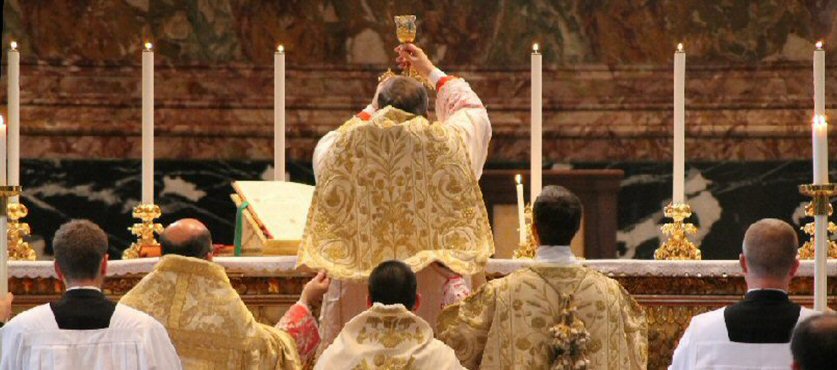The Open Forum
Msgr. Gilles Wach - The Institute of Christ the King Sovereign Priest
Mgr. Wach opened by saying that the Institute was doing well because the Church was doing badly, and that he would prefer that it were the other way around. The Institute's spirituality and desires are centralised round unity in the church and the need for charity in all of our activities. There were over 30 new seminarians, 11 from the United States. A group of sisters engaged in adoration had joined them; they have 7 postulants. Their housing is not yet ready, so they are temporarily in Florence. The Cardinal of Florence came to give them the veil. In the United States, things are going very well. They have churches in Chicago, St. Louis, and Kansas City, in addition to one in Wausau. There is much restoration work to do on the one in Chicago. Msgr. Wach found it amusing that a German preached in French on the Feast of St. Louis to Americans in their Church in St. Louis. They are serving in a variety of French dioceses, and their apostolate in Versailles is going well. In Africa, they are, of course, facing the Moslem threat. The Institute is very happy about Pope Benedict. Msgr. Wach said that we must stay firm and not give in to pressures for concessions, but be charitable and diplomatic.
Father Josef Bisig - The Priestly Fraternity of St. Peter (FSSP)
Father Bisig reminded GA-delegates that during the next months unity between priests and laity is very important. We shall pray and hope that the plans of Cardinal Ratzinger will be realized by Pope Benedict XVI.
Father Bisig offered the FIUV his condolences for the death of the two honorary Presidents, Michael Davies and Eric de Saventhem, mentioning that Mr. de Saventhem was one of the initiators of the traditional apostolate in the USA.
Aljaksandar Jan Stralcou-Karwacki (Belarus)
At the end of the 1980s there were 2.5 millions baptised Catholics in Belarus and only about 70 catholic priests who were quite old and often of Polish origin. During the Russian occupation there were nearly no outside contacts so that the liturgical changes were implemented very slowly. When young priests came from Poland the NOM was established in Belarus, especially as it is used in the two seminaries. Now there are some 500 priests in Belarus. A priest of the FSSP is celebrating the traditional mass in Minsk and some old priests are celebrating it in their local churches.
The NOM is not completely "new", i.e. there are still some traditional elements, such as celebration versus Deum, receiving Holy Communion on the tongue. Therefore it is difficult to argue for the classical Roman rite to be necessary. Groups like Neocatechumenate come from Poland and try to find supporters.
With the exception of one bishop the episcopate in Belarus is conservative. It is important that priestly fraternities/institutes get into contact with the hierarchy, e.g. with the auxiliary bishop of Minsk.
Miklós István Földváry (Hungary)
The report of Una Voce Hungary is attached to this document.
Msgr. Camille Perl - Papal Commission Ecclesia Dei
Mgr. Perl sent the greetings of Cardinal Hoyos. He said it is clear that times have changed; prelates of the Curia now greet him when he crosses St. Peter's Square. The Commission still has to deal with the fact that traditionalists ask it for things beyond its powers. Still, we have a new Pope. He is not a liturgist, but, obviously, his opinion is important. We are just at the beginning of the pontificate, and there are three problems that are of concern in this realm: the treatment of traditionalists, the reform of the reform, and the reconciliation of Society of St. Pius X. It is hard to say what will happen, when and how something will happen, and whether other Church problems may take precedence over our concerns.
Zie ook verslag uit Inside the Vatican
Juventutem
The President summarised the report to the Assembly sent by Fr. de Malleray FSSP (see appendix) and reported that he had already pledged the support of FIUV to the planned forward initiatives of Juventutem.
